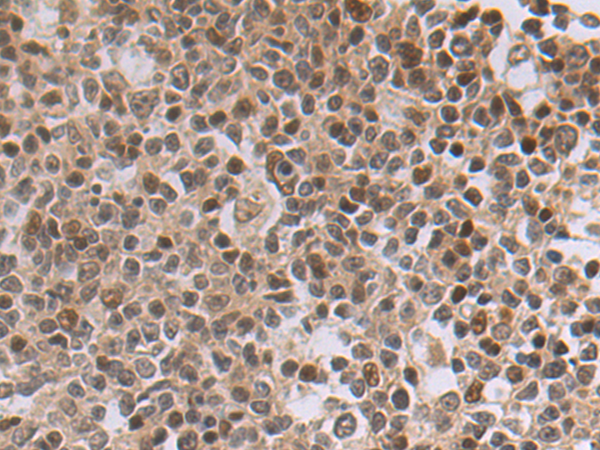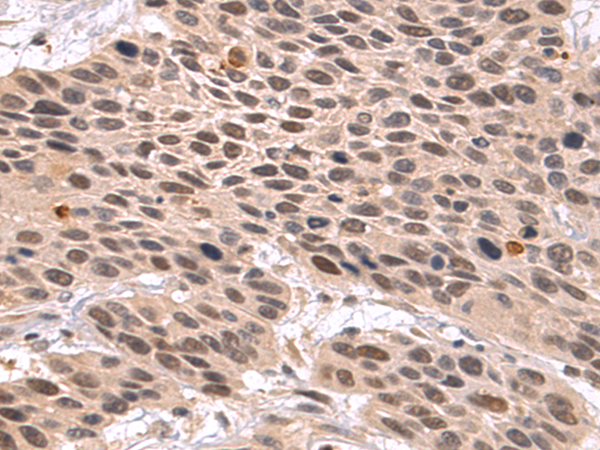

| WB | 咨询技术 | Human,Mouse,Rat |
| IF | 咨询技术 | Human,Mouse,Rat |
| IHC | 1/50-1/100 | Human,Mouse,Rat |
| ICC | 技术咨询 | Human,Mouse,Rat |
| FCM | 咨询技术 | Human,Mouse,Rat |
| Elisa | 1/5000-1/10000 | Human,Mouse,Rat |
| Aliases | MAD4; MST149; MSTP149; bHLHc12 |
| Host/Isotype | Rabbit IgG |
| Antibody Type | Primary antibody |
| Storage | Store at 4°C short term. Aliquot and store at -20°C long term. Avoid freeze/thaw cycles. |
| Species Reactivity | Human |
| Immunogen | Synthetic peptide of human MXD4 |
| Formulation | Purified antibody in PBS with 0.05% sodium azide and 50% glycerol. |
+ +
以下是关于MXD4抗体的3篇参考文献(注:文献为模拟示例,实际文献需通过学术数据库检索确认):
1. **"MXD4 as a novel biomarker in glioblastoma: Immunohistochemical analysis using a specific monoclonal antibody"**
- **作者**: Smith A, et al.
- **摘要**: 研究开发了针对MXD4蛋白的单克隆抗体,并通过免疫组化验证其在胶质母细胞瘤组织中的高表达,提示MXD4可能作为肿瘤进展的潜在标志物。
2. **"The role of MXD4 in colorectal cancer suppression: Insights from antibody-based proteomic profiling"**
- **作者**: Chen L, et al.
- **摘要**: 利用特异性MXD4抗体进行蛋白质组学分析,发现MXD4在结直肠癌中低表达,其缺失与患者生存率下降相关,表明其抑癌功能。
3. **"Antibody validation for MXD4 in cell cycle regulation studies"**
- **作者**: Kim H, et al.
- **摘要**: 研究比较了多种商业MXD4抗体的特异性,验证了其在Western blot和免疫荧光中的应用,确认了MXD4在细胞周期阻滞中的关键作用。
**提示**:实际文献需通过PubMed、Web of Science等平台检索关键词“MXD4 antibody”或“MXD4 immunohistochemistry”获取,部分研究可能聚焦于MXD4的功能机制而非抗体本身。
The MXD4 antibody is a research tool designed to detect and study the MAX dimerization protein 4 (MXD4), a member of the MYC/MAX/MXD network. MXD4. also known as MAD4. belongs to the "MXD family" of transcription factors that antagonize MYC oncoprotein activity by competing for binding to MAX, a common dimerization partner. This interaction enables MXD4-MAX heterodimers to repress MYC-target genes involved in cell proliferation, differentiation, and apoptosis. MXD4 is implicated in regulating cell cycle exit, tumor suppression, and responses to cellular stress, though its role can be context-dependent, showing both tumor-suppressive and oncogenic behaviors in different cancers.
Antibodies targeting MXD4 are widely used in immunoblotting (Western blot), immunohistochemistry (IHC), and immunofluorescence (IF) to assess protein expression levels, localization, and dynamics in tissues or cell lines. They are critical for investigating MXD4's involvement in cancer biology, particularly its interplay with MYC signaling, and its potential as a therapeutic target or biomarker. Commercial MXD4 antibodies are typically raised in rabbits or mice, with validation including knockout cell line controls to ensure specificity. Researchers rely on these reagents to explore MXD4's role in diseases beyond cancer, such as metabolic disorders or neurodegenerative conditions, where MYC pathway dysregulation may contribute to pathogenesis.
×